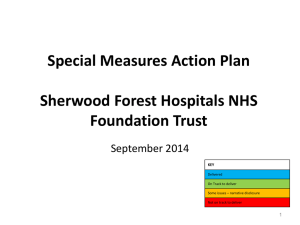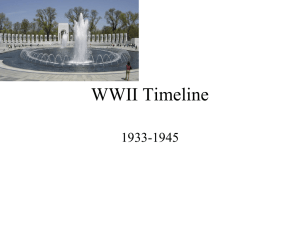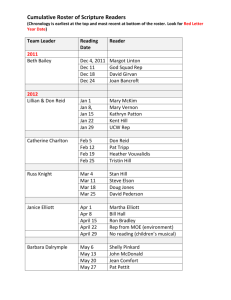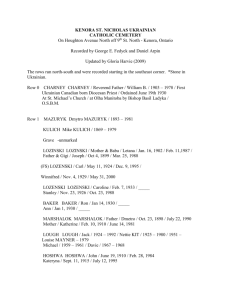HSCP28214DrCrowley.p
advertisement
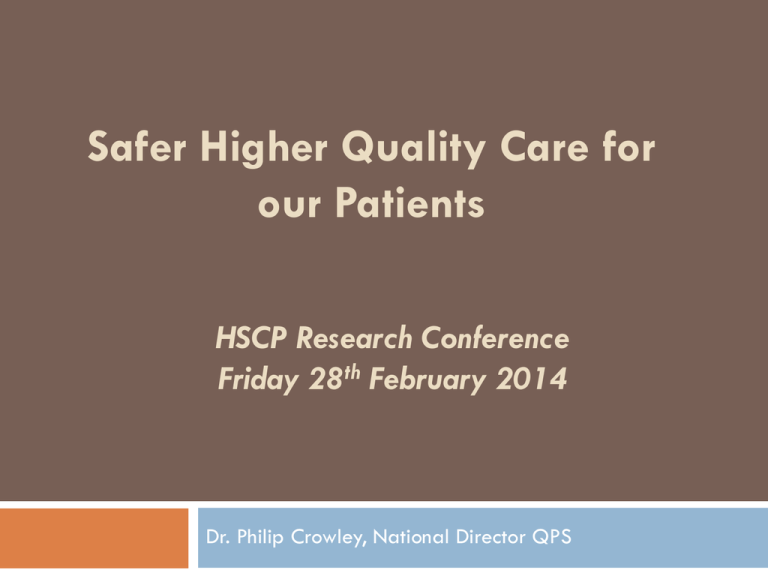
Safer Higher Quality Care for our Patients HSCP Research Conference Friday 28th February 2014 Dr. Philip Crowley, National Director QPS Media coverage €320k payout as hospital says sorry over death from dehydration Healthcare System Failures Where does improvement Happen? National Group Ward Quality Improvement of Patient care Where Improvement Happens Pathways Leadership Patient involvement Clinical Governance Education & Learning: - Measurement - QI Methods Guidelines Collaboratives Conditions Quality Improvement of Patient care National Group Ward A culture change – safety first 1. Individual relationship between HSCP and patient 2. Multidisciplinary Team / Ward 3. Hospital / organisation Patient and H+SCP Take ownership – accountable for the safety of care Pivotal role in respecting and defending the dignity of every stage of life Pivotal role in advocating for and on behalf of patients What are the 3 biggest challenges that prevent me in delivering care – communicate out and up MDT and Ward Leadership role in drawing others into supporting change Engaging Patients and staff you manage Safety Pause MDT and Ward Understanding what safety and quality means for your ward Safer Better Healthcare Standards Multidisciplinary team prompts MDT and Ward How well are you delivering Safe Quality Care QA+I tool, clinical audit Clinical audit guidelines Hospital / Organisation Strong culture of Governance for Quality and Safety – be a champion for quality/question everything Generate a culture of listening to your staff and patients Quality and Safety Walkrounds Transparency Patients – open disclosure Measurement – Quality Profile Checklists Safe survey national policy and checklist Ward rounds principles for best practice and checklist Open disclosure National Guidelines National Policy Guide for health and social care staff Patient information leaflet Staff support ‘assist me’ model 0 Oct 4 2 1 2 1 Post Operative Hip # 1.5 1 0.5 0 Mortality Indicators 2 0 0 4 Time to Hip # surgery 5 1.5 1 0.5 0 0 5 0 4 Medication Management 10 2 6 2 6 3 1 6 3 0 1 0 1 1 5 1 1 1 3 4 Dec 1 0 Oct Wound Dehiscence 2 Nov 2 5 Sept 1 1.5 1 0.5 0 2 July Aug Transfusion Reaction May 3 0 2 June 5 April In hospital fracture March 0 1 Jan Feb March April May June July Aug Sept Oct Nov Dec 2 Jan Feb March April May June July Aug Sept Oct Nov Dec Dec Nov Oct Aug 4 Feb Dec 2 Dec Oct 1 Nov 0 Sept 2 Nov Sept July 0 Oct Sept Aug July May June 1 Aug 2 July 1.5 June April 0 June May April Feb March 2 Jan 1 0.5 May Post Operative DVT / PE March Jan 3 Jan Feb March April May June July Aug Sept Oct Nov Dec 2 0 Feb 4 April 3 1 March 2 Jan 4 Feb Accidental Puncture or Laceration Jan 0 0 0 0 0 0 0 0 Jan Feb March April May June July Aug Sept Oct Nov Dec Dec 1 6 4 2 0 Jan Feb March April May June July Aug Sept Oct Nov Dec Dec Oct Nov Jan Feb March April May June July Aug Sept Oct Nov Dec Foreign Body left in Post Operatively Jan Feb March April May June July Aug Sept Oct Nov Dec Dec Oct 2 Nov 3 Nov Aug Sept 4 Sept 2 1 Sept July 1 Aug July 6 Aug May June Occurances 0 0 0 July May 2 June 2 May April March 10 June 0 4 April 3 March Jan Feb March April May June July Aug Sept Oct Nov Dec 20 April 0 Feb 2 1 0 March Quality Improvement Jan 0 Feb + Jan Staff Experience 10 Feb Patient Experience Jan Quality Profile Dashboard of Quality Indicators and Outcome Measures 10 In hospitals falls 3 7 0 Post Operative Sepsis 1 5 0 Iatrogenic Pneumothorax 1 Cardiac Arrest 3 2 1 10 Pressure Ulcers 5 2 1 Employee Likelihood to Recommend Employees & Patients: Likelihood to Recommend Patient Likelihood to Recommend Press Ganey Associates 16 How can we support you? Quality and Patient Safety Division Patients and Staff Engagement Improvement Supporting and Assuring Quality Areas for focus by QPS Listen to staff Foster development and growth Listen to and empower patients Embrace Transparency through Measurement (Indicators/Clinical Audit) Improve the Safety of Patients QI skills and knowledge Patient central Patient Forums National Healthcare Charter Patient Safety Champions Measuring experience Surveys Patient stories – from ward to board Listening to Staff Staff experience – seek and value feedback/ideas for improvement Patient Safety Culture Survey/ Walk-rounds Prioritise staff welfare ‘Walk in my shoes’ Elements of the National QI Programme Each parallel element targets a different level of healthcare professional, maximising penetration of QI capability across the hospital system Measurement ASK FOR THE DATA Data driven quality improvement Number of incidents plus trends Ensuring preventable don’t keep reoccurring Quality Profile New quality indicators Patient experience and Staff experience Complaints… Clinical audit Use data to generate light not heat Berwick’s Challenge Abandon blame as a tool and trust the good will and good intentions of staff Reassert the primacy of working with patients and carers to achieve healthcare goals Use quantitative targets with caution – they should never displace the primary goal of better care Recognise that transparency is essential and expect and insist on it Give staff career-long help to learn, master and apply modern methods for quality improvement Make sure pride and joy in work, not fear, infuse the service Thank You Oh! The places you’ll go..... And will you succeed? Yes! You will, indeed! (98 and ¾ percent guaranteed.) Kid, you’ll move mountains! Today is your day! Your mountain is waiting. So…get on your way! Dr. Seuss





